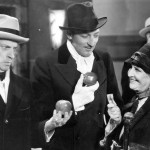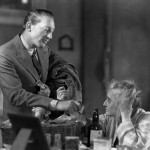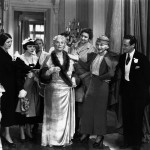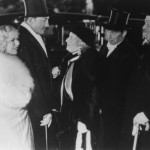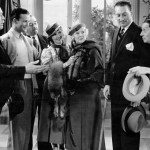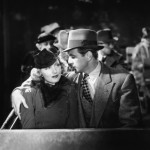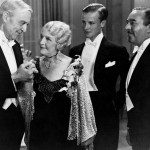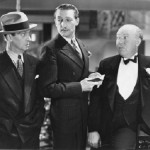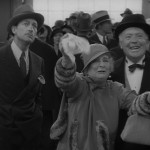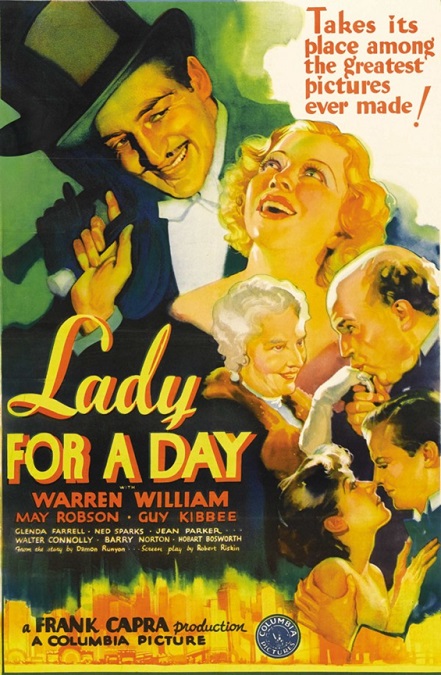
Lady for a Day – 1932 / 1933
Lady for a Day was not a great or profound movie, but it was certainly a sweet one. It had a simple plot and feel-good ending. Right from the start, I was struck by the wonderful acting of May Robson. She played the part of a poor woman called Apple Annie. She was so good in the way that she played… well, slightly crazy. It was not overdone. On the contrary, she was incredibly believable.
She was called Apple Annie because her only income was made by selling apples on the street. But fortune smiled on her when she met Dave the Dude, played by Warren William, a gangster and con-artist who was very superstitious. He believed that as long as he bought an apple from Annie before each gambling bet or business deal, things would go his way. He refused to do anything without one of her apples. So when Annie was in trouble, the Dude went out of his way to help her. Way out of his way.
Her problem was that she had been writing to her daughter in Spain, telling her that she was a rich woman in New York high society. But when her daughter Louise, played by Jane Parker, becomes engaged to the son of a Spanish Count, her lie is certain to be exposed. Robson was simply wonderful. The whole plot almost sounds like a shoe-in to be a comedy, and though there were some pretty comedic moments and funny lines, the character of Annie has the most dramatic moments of the film. She fears that her secret will be revealed and the shame that would certainly accompany such an exposure drive her deeper into depression and hysterics. You really feel for her in her dire straits.
But the Dude’s fear of losing his good luck charm prove to be the saving of Annie and her daughters dreams of marrying the Count’s son. He borrows a friend’s mansion, buys her beautiful clothes, pays a pool shark to pose as her husband, and hires all his mob connections to be her high-society acquaintances. But everything goes awry when he has to kidnap three news reporters to prevent them from investigating Annie’s rich alter ego, Mrs. E. Worthington Manville. Of course, when the reporters turn up missing the police get involved.
The plot was not overly complicated and the acting was pretty good. Warren’s right hand man, Happy McGuire, played by Ned Sparks, did a good job. I actually have to mention him here because he was also in another Best Picture nominee from 1934, Imitation of Life. I didn’t care for him in that film because he played a business man exactly like he played the gangster in this movie. He was fine as a gangster, but not so much as the honest business man.
Another stand-out member of the cast was Guy Kibbee, playing the part of Henry G. Blake, otherwise known as Judge Manville, Annie’s “husband.” He was smart, witty, cool under pressure, and quick with a smile. He was a very likeable character, and Kibbee did a fine job.
There was one scene in particular that stood out to me, in which the Count asks Judge Manville about Louise’s dowry. Blake tries to talk his way out of it, knowing that the Dude can’t afford a fifty thousand dollar dowry. As the two men are walking down the corridor of the mansion, they happen to pass a billiards room. Being the professional pool-hall shark that he was, he easily turned the tables. By the time their match was done, he has gotten the Count to pay for the dowry himself. It was quite amusing.
All in all, it was a good movie. In the end, Annie got to keep her secret and everybody got a happy ending. Of course, the movie was over before we saw Annie have to give back all the clothes and rented jewels, leave the mansion, and return to her poor hovel of a home. We all know that when the fantasy is over, she will be back on the streets selling her apples.
If you think about it like that, it is a depressing idea. But director, Frank Capra, let us all off the hook by leaving us our happy ending. By doing that, he also gave us a tiny sliver of hope. Maybe Henry Blake has fallen in love with Annie for real and is willing to take care of her. Who knows what might happen when the cameras stop rolling.
